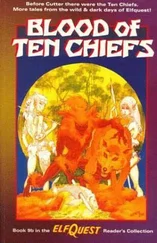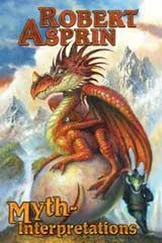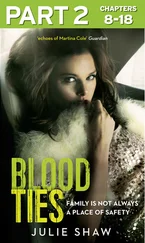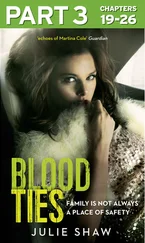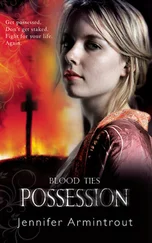Robert Asprin - Blood Ties
Здесь есть возможность читать онлайн «Robert Asprin - Blood Ties» весь текст электронной книги совершенно бесплатно (целиком полную версию без сокращений). В некоторых случаях можно слушать аудио, скачать через торрент в формате fb2 и присутствует краткое содержание. Жанр: Фэнтези, на английском языке. Описание произведения, (предисловие) а так же отзывы посетителей доступны на портале библиотеки ЛибКат.
- Название:Blood Ties
- Автор:
- Жанр:
- Год:неизвестен
- ISBN:нет данных
- Рейтинг книги:3 / 5. Голосов: 1
-
Избранное:Добавить в избранное
- Отзывы:
-
Ваша оценка:
- 60
- 1
- 2
- 3
- 4
- 5
Blood Ties: краткое содержание, описание и аннотация
Предлагаем к чтению аннотацию, описание, краткое содержание или предисловие (зависит от того, что написал сам автор книги «Blood Ties»). Если вы не нашли необходимую информацию о книге — напишите в комментариях, мы постараемся отыскать её.
Blood Ties — читать онлайн бесплатно полную книгу (весь текст) целиком
Ниже представлен текст книги, разбитый по страницам. Система сохранения места последней прочитанной страницы, позволяет с удобством читать онлайн бесплатно книгу «Blood Ties», без необходимости каждый раз заново искать на чём Вы остановились. Поставьте закладку, и сможете в любой момент перейти на страницу, на которой закончили чтение.
Интервал:
Закладка:
The slow hooffalls echoed in the alleyway, off the narrow walls; and another woman, overtaken alone in this black gut of Sanctuary's dark streets, might have thought of finding some refuge. Ischade merely turned, aware that some night rider had turned his horse down the alley, that he still came on, slowly, provoking nothing.
In fact, being what she was, she knew who he was before she ever turned her face toward him; and while another woman, knowing the same, might have run in search of some doorway, any doorway or nook or place to hide or fight, Ischade drew a quiet breath, wrapped her arms and her black robes about her, and regarded him in lazy curiosity.
"Are you following me?" she asked of Tempus.
The Tr6s's hooves rang to a leisurely halt on the cobbles, slow and patterned echo off the brick walls and the cobbles. A rat went skittering through a patch of moonlight, vanished into a crack in an old warehouse door frame. The rider towered in shadow. "Not a good neighborhood for walking."
She smiled and it was like most of her smiles, like most of her amusements, feral and dark. She laughed. There was dark in that too: and a little pang of regret. "Gallantry."
"Practicality. An arrow-"
"You didn't take me unaware." She rarely said as much. She was not wont to justify herself, or to communicate at all; she found herself doing it to this man, and was distantly amazed. She felt so little that was acute. The other feeling was simply awareness, a web the quiverings of which were always there. But perhaps he did know that, or suspect it. Perhaps that was why she answered him, that she suspected a deeper question in that comment than most knew how to ask. He was shadow to her. She was shadow to him. They had no identity and every identity in Sanctuary, city of midnight meetings and constant struggle, constant connivance.
"I heal," he said, low and in a voice that went to the bones. "That's my curse."
"I don't need to," she said in the same low murmur. "That's mine."
He said nothing for a moment. Perhaps he thought about it. Then: "I said that we would try them... yours and mine."
She shivered. This was a man who walked through battlefields and blood, who was storm and gray to her utmost black and stillness; this was a man always surrounded by men, and cursed with too much love and too many wounds. And she had none of that. He was conflict personified, the light and the dark; and she settled so quickly back to stasis and cold, solitary.
"You missed your appointment," she said. "But I never wait. And I don't hold you to any agreement. That's what I would have told you then. What I did, I did. For my reasons. Wisest if we don't mix."
And she turned and walked away from him. But the Tr6s started forward as if stung, and Tempus, shadowlike, circled to cut her off.
Another woman might have recoiled. She stood quite still. Perhaps he thought she could be bluffed, perhaps it was part of a dark game; but in his silence, she read another truth.
It was the challenge. It was the unsatisfiable woman. The man who (like too many others) partly feared her, feared failure, feared rejection; and whose godhood was put in question by her very existence.
"I see," she said finally. "It isn't your men you're buying."
There was deathly silence then. The horse snorted explosively, shifted. But he did not lose his control, or lose control over the beast. He sat there in containment of it and his own nature, and even of his wounded honesty.
Offended, he was less storm and more man, a decent man whose self-respect was in pawn: whose thought now was indeed for the lives and the souls he had proposed himself to buy. He was two men; or man and something much less reasonable.
"I'll see you home," he said, like some spurned swain to the miller's daughter. With, at the moment, that same note of martyred finality and renouncement. But it would not last at the gate. She did not see the future, but she knew men, and she knew that it was for his own sake that he said that, and offered that, in his eternal private warfare-with the storm. Man of grays and halftones. He tormented himself because it was the only way to win.
She understood such a battle. She fought it within her own chill dark, more pragmatically. She staved things off only daily, knowing that the next day she would not win against her appetites; but the third she would be in control again; so she lived by tides and the rhythms of the moon, and knowing these things she kept herself from destructive temptations. This man served a harsher, more chaotic force that had no regular ebb and flow; this man warred because he had no peace, and no moment when he was not at risk.
"No," she said, "I'll find my own way tonight. Tomorrow night. Come tomorrow."
She waited. In his precarious balance, in his battle, she named him a test of that balance and she knew even the direction his soul was sliding.
He fought it back. She had not known whether he could, but she had been sure that he would try. She knew the silent anger in him, one half against the other, and both suspecting some despite. But there was the debt he owed her. He backed the Tros and she walked on her way down the alley unattended.
Another woman might have suffered a quickening of the pulse, a weakness in the knees, knowing who and what eyes were staring anger at her back. But she knew equally well what he was going to do, which was to sit the Tr6s quite still until she had passed beyond sight. And that he would wait only to prove that he could wait, when the assaults would come on his integrity, not knowing any tide at all.
He touched her, in a vague and theoretical way. She respected him. She took a monumental chance in what he proposed for payment, not knowing whether either of them might survive it. Perhaps he knew the danger and perhaps not. For herself, she felt only the dimmest of alarms. It was the dreadful ennui again, the sense of tides.
The fact was that she missed Roxane. She missed her own household of traitors. She missed them with the feeling of a body totally enervated, the ancient ennui the worse to bear because for a little while, so long as there had been an enemy and a challenge, she had been alive, for a little while she had been stirred out of a still and waking sleep.
Only her lovers could touch her when the ennui was heaviest. It was not the sex for which she killed. It was the moment of anguish, of terror, of power or of fear or sorrow-it never mattered which. It never lasted long enough even to identify. There was only the instant that had to be tried again and again, to try to know what it was.
Perhaps (sometimes she wondered) it was the only moment she was alive.
The Tros horse thundered from the alley, the rider never looking back; and Straton, Stepson, pressed himself flat against the streetward wall, staring after Tempus until horse and rider merged with the night.
And turned abruptly and looked down the dark and empty alleyway, knowing that Ischade would have gone.
That she would blast him to hell for spying on her business.
He heard rumors of her-heard!-gods, he had heard a thousand whispers without hearing them, not truly. Then- then he had taken a bad one, then he had spent long enough in hell to shake any man from his confidence in himself, in his choices, in the fool gesture that had sent him blind angry onto a street without his cautions or his wits. Now for the rest of his life there might be the small twinges of pain, all unexpected, that shot through his shoulder when he moved his arm at the wrong angle, an unpredictable pain that enraged him when it would come shooting through and he would stop in a certain reach, at an angle. It came so quickly and so indefinably that he could not feel whether it was the pain of scarred tendons and joint running up against their limit and freezing dead, or whether it was only the pain that froze the arm, in an eyeblink of flinching that he was not man enough to master. He tried with exercise and with dogged resistance when it did freeze; but still it betrayed him at bad moments.
Читать дальшеИнтервал:
Закладка:
Похожие книги на «Blood Ties»
Представляем Вашему вниманию похожие книги на «Blood Ties» списком для выбора. Мы отобрали схожую по названию и смыслу литературу в надежде предоставить читателям больше вариантов отыскать новые, интересные, ещё непрочитанные произведения.
Обсуждение, отзывы о книге «Blood Ties» и просто собственные мнения читателей. Оставьте ваши комментарии, напишите, что Вы думаете о произведении, его смысле или главных героях. Укажите что конкретно понравилось, а что нет, и почему Вы так считаете.

